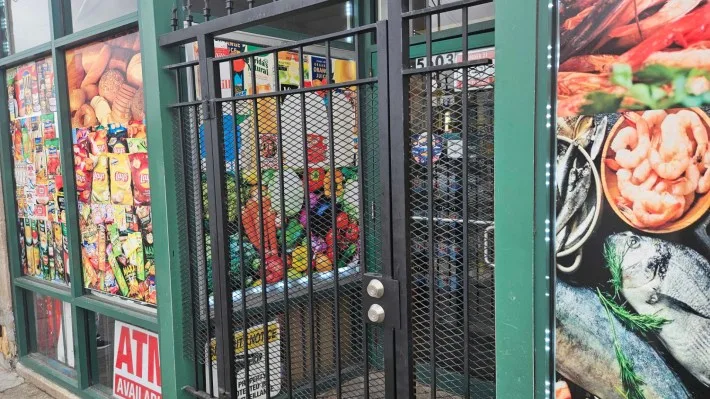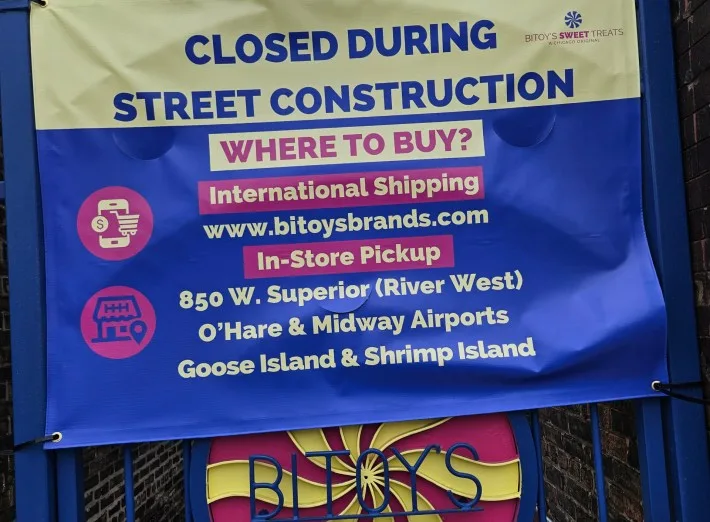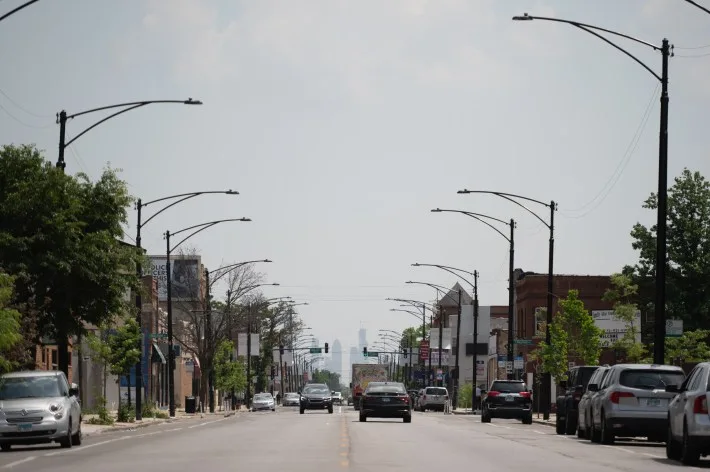AUSTIN — The Soul City Corridor overhaul of Chicago Avenue through the Austin neighborhood is promising new commercial life and vibrancy to the area — but in the meantime, it’s bringing headaches for existing businesses.
The Chicago Department of Transportation is rebuilding Chicago Avenue — including roads, sidewalks and more — between Austin Boulevard and Cicero Avenue, a project that broke ground in November
Recent additions include new trash cans, street lighting and sewer drainage improvements to prevent flooding, a much needed improvement in the area after record rainfall this summer.
Other additions coming include bike lanes, street resurfacing, cultural identifiers and more.
But the ongoing construction means some pains for local businesses.
 Credit: Trey Arline/ Block Club Chicago
Credit: Trey Arline/ Block Club ChicagoThe road on the western portion of the project has been narrowed as a result of sidewalk reconstruction. Parking in certain areas is inaccessible near other businesses and fills up quickly where available.
Bitoy’s Sweet Treats, 5957 W. Chicago Ave., has temporarily closed due to the street construction. Founder Layla Bitoy said the lack of foot traffic has hurt their bottom line.
Currently their store is asking customers to order online or pick up at their River West location, 850 W. Superior Ave.
“We were considering shutting down brick and mortar operations because we are seeing a significant decrease in our sales,” Bitoy’s owners said. “We made this nice mural and made these improvements during COVID and nobody can come in to experience it.”
 Credit: Trey Arline/Block Club Chicago
Credit: Trey Arline/Block Club ChicagoBitoy’s was one of a handful of businesses open nearby. Meanwhie, dilapidated buildings, locked gates and empty storefronts with welcome banners was a common sight in the area. Some buildings such as barbershops have reduced their hours and staff on Fridays to mitigate the lack of foot traffic.
Ishmel Laboy, owner of Certified Cuts Barbershop & Beauty Salon on 5941 W. Chicago Ave. said the lack of parking access has been tough on business and customers coming to the store, leading people to frequent the salon less.
“I only got three customers this Tuesday [afternoon] when I’m usually completely booked,” Laboy said. “We have customers parking two blocks away to come in here. It’s a good thing in a way, but the way they’re doing it and it will be going on for a long period of time. It sucks on us, and we can’t find any parking.”
Laboy also said he has had to reduce staff hours from full time to part time for some workers. He said the city should be more proactive about making it easier for neighbors to park near businesses, suggesting empty lots near the corridor on Mayfield Avenue.
“When they do projects like this, they should give new places to park our cars. I feel like the city didn’t consider how it would affect us as business owners,” he said.
The project is broken up into three sections: between Austin Boulevard and Central Avenue, Central and Laramie avenues and Laramie and Cicero avenues.
The work on the westernmost section is scheduled to go until late 2024, with the entire project slated to wrap in 2025.
 Credit: Colin Boyle/Block Club Chicago
Credit: Colin Boyle/Block Club ChicagoNew businesses opening in the Soul City Corridor include Urban Essential Coffee Cafe on 5300 W. Chicago Ave, a family-owned coffee shop owned by Robbie and Destiny Wilkerson.
Malcolm Crawford, executive director of Austin African American Business Networking Association, said the project to revive the corridor will hopefully become an international economic and cultural development model for communities of color.
He acknowledges some businesses have been negatively impacted, but he feels the project is helping the community long-term.
“I’ve cried tears over not getting things done [here] in the past. But it feels like people are really starting to buy into the concept, not just for Austin but also for us as [Black] people,” he said. “We were so happy to just get trash cans, we almost threw a party. Some people take that for granted. We have been needing some of these for decades, and I’m happy that there’s been some progress made.”
Chicago Department of Transportation spokeswoman Erica Schroeder said the lack of parking access is an unfortunate downside to the construction in order to prioritize safety, and impacts on parking will shift overtime. She said any construction affecting parking will be done by next summer.
“Ultimately these infrastructure improvements on Chicago Avenue will create a more vibrant corridor that supports pedestrian activity, shopping, services, public spaces, and quality-of-life improvements for residents,” she said in a statement to Block Club.
Forty Acres Fresh Market founder Liz Abunaw, who is planning a brick-and-mortar store at 5713 W. Chicago Ave., said the corridor’s improvements would be a net positive for the community with the grocery store as a primary centerpiece of its development.
She said Black neighborhoods such as those around the Soul City Corridor have been overlooked for decades due to the lack of strong infrastructure that raise the value of a neighborhood such as a grocery store.
“Real infrastructure is more than just buildings. It’s jobs, education and green space,” Abunaw said. “Being within walking distance of a store where you can do complete shopping is part of basic infrastructure a community needs. When you live in an anti-Black society, you have to counteract the narratives that they don’t deserve these things.”
Watch our “On The Block” TV show on The U, CW26 and MeTV.
Listen to “It’s All Good: A Block Club Chicago Podcast”:


